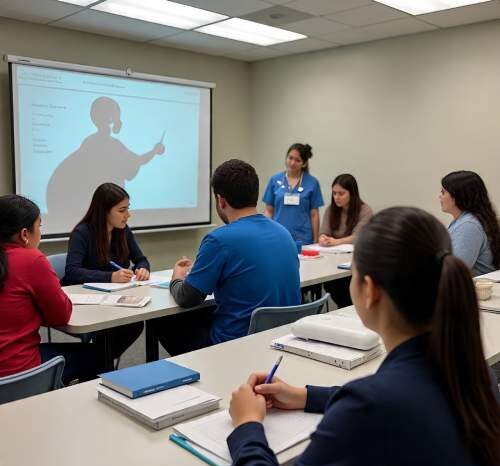Ultimate Guide: How to Earn Your PhD in Nursing in the US and Unlock Prestigious Career Opportunities in 2025
How to Earn Your PhD in Nursing in the US

Ready to Shape the Future of Healthcare? Here’s How to Earn Your PhD in Nursing in the US
If you’re searching for how to earn your PhD in Nursing in the US, you’re likely ready to move beyond clinical care and into a career that influences healthcare policy, research, and nursing education. Earning a Doctor of Philosophy (Ph.D.) in Nursing is the ultimate academic achievement for registered nurses (RNs) looking to lead the profession forward. This advanced degree equips you with the expertise to conduct original research, teach at top universities, and contribute to evidence-based improvements in nursing practice.

Unlike clinical roles, Ph.D. prepared nurses drive systemic change. They investigate complex healthcare issues, publish groundbreaking studies, and mentor future nurse leaders. Whether you’re passionate about public health, clinical research, nursing ethics, or health systems innovation, understanding how to earn your Ph.D. in Nursing in the US is your first step toward making a long-lasting impact.
This comprehensive guide breaks down every essential detail—from what a Ph.D. in Nursing really means, to the exact steps on how to earn your PhD in Nursing in the US, the typical timeline, tuition costs, and the prestigious career opportunities waiting for you. You’ll also learn the key differences between a Ph.D. and a DNP, so you can make the best choice for your professional goals.
With the U.S. Bureau of Labor Statistics projecting a 40% increase in advanced practice nurse roles and an 8% rise in nursing faculty jobs by 2033 (BLS, 2024), there’s no better time to explore this transformative path. Ready to rise to the top of your field? Let’s map out your journey to becoming a Ph.D.-prepared nurse in the US.
What Is a PhD in Nursing?
Understanding the Path to Becoming a Nurse Scientist
Before diving into how to earn your PhD in Nursing in the US, it’s essential to understand what this prestigious degree actually involves. A PhD in Nursing is a research-focused terminal degree designed to prepare nurses as scholars, scientists, educators, and academic leaders. Unlike the Doctor of Nursing Practice (DNP)—which centers on advanced clinical care, a PhD emphasizes the discovery of new knowledge through research and theory.

PhD prepared nurses design and lead original research studies, analyze healthcare systems, and develop evidence-based solutions to improve patient care and nursing practice. These nurse scientists often work in universities, research institutions, or policy organizations—shaping the future of nursing through innovation and education rather than direct patient care.
In contrast, becoming a Registered Nurse (RN) involves clinical licensure, usually achieved through a BSN or ADN, with a primary focus on bedside care. While RNs implement best practices, PhD trained nurses create those practices through rigorous research. If your long-term vision includes influencing healthcare at the systems level, teaching future nurses, or contributing to national nursing standards, then learning how to earn your PhD in Nursing in the US is the first step toward that impactful career.
According to the American Association of Colleges of Nursing (AACN), Ph.D. programs develop nurse leaders who “advance the entire nursing profession” by producing evidence that transforms both education and clinical practice. These roles are critical, especially now, as the demand for nursing faculty and researchers continues to rise.
Step-by-Step: How to Earn Your PhD in Nursing in the US
Becoming a Ph.D.-prepared nurse is a multi-step journey that requires academic dedication, clinical experience, and a passion for research. Below is a clear pathway for aspiring nurse scientists who want to understand exactly how to earn your PhD in Nursing in the US, broken down into six essential steps:
| Step | Description | Estimated Time |
|---|---|---|
| 1. Earn a BSN | Complete a Bachelor of Science in Nursing (BSN) program – your foundation in professional nursing. | ~4 years (full-time) |
| 2. Become an RN | Pass the NCLEX-RN exam to receive licensure and begin working as a registered nurse. | ~2–3 months (exam prep) |
| 3. Gain Experience | Work as an RN to build clinical knowledge; most Ph.D. programs prefer applicants with field experience. | 1–3 years |
| 4. Earn an MSN | Some nurses pursue a Master of Science in Nursing (MSN); however, some Ph.D. programs admit BSN grads directly. | ~2 years (if required) |
| 5. Apply to Ph.D. | Apply to accredited Ph.D. in Nursing programs with strong academic records, recommendation letters, and a compelling research goal. | ~6–12 months |
| 6. Complete the Ph.D. | Enroll in a full-time Ph.D. program. Expect advanced coursework, research training, and a dissertation. |
~4–6 years (full-time) |
The 6 Essential Steps: How to Earn Your PhD in Nursing in the US
If you’re ready to take the leap from clinical practice to academic leadership, understanding the step-by-step process of how to earn your PhD in Nursing in the US is crucial. While every nurse’s journey is unique, most successful candidates follow these six foundational steps to become Ph.D.-prepared nurse scientists:
1. Earn a BSN (Bachelor of Science in Nursing)
Your journey begins with a BSN degree, the minimum academic requirement for entry into graduate-level nursing programs. This four-year program builds a strong foundation in nursing theory, evidence-based practice, clinical skills, and research methodology. Some nurses start with an associate degree and later bridge to a BSN, but a bachelor’s degree is essential if you’re planning on pursuing a Ph.D. in Nursing in the US.
2. Pass the NCLEX-RN and Become a Licensed RN
After completing your BSN, you must pass the NCLEX-RN to become a licensed registered nurse. This licensure enables you to work in clinical settings and gain real-world nursing experience—an important part of how to earn your Ph.D. in Nursing in the US. During this stage, many nurses begin identifying gaps in care or practice areas they might want to explore through research later in their doctoral work.
3. Gain Clinical Experience (1–3 Years)
Most Ph.D. in Nursing programs prefer or require applicants to have hands-on nursing experience. Spending time in the field allows you to witness firsthand the challenges and opportunities in healthcare—insights that often inspire your future research questions. Whether you work in critical care, community health, pediatrics, or mental health, this clinical exposure strengthens your application and sharpens your research focus.
4. Complete an MSN (Optional or Required)
Although some universities offer BSN-to-Ph.D. programs, many nurses earn a Master of Science in Nursing (MSN) before applying to doctoral study. The MSN typically takes two years and allows you to deepen your expertise in a specialty area such as nurse education, administration, or informatics. It may also include early exposure to scholarly writing, small research projects, and teaching opportunities. If you’re unsure whether to pursue a Ph.D. right away, the MSN can be an excellent transitional step.
5. Apply to a Ph.D. in Nursing Program
This is a major milestone in your journey to earn your PhD in Nursing in the US. Start by identifying programs aligned with your interests—such as health equity, chronic disease, nursing education, or informatics. Admission requirements generally include:
-
Academic transcripts (BSN/MSN)
-
Letters of recommendation
-
Resume or CV
-
Statement of purpose or research intent
-
GRE scores (optional at many schools)
-
An interview or writing sample
Begin preparing your application materials well in advance. Many programs also offer funding through research assistantships, teaching fellowships, or scholarships, so be sure to explore those options.
6. Complete Your Ph.D. Program (4–6 Years)
Once admitted, you’ll embark on the most intensive phase of how to earn your PhD in Nursing in the US. Your doctoral studies will include coursework in:
-
Nursing theory
-
Quantitative and qualitative research methods
-
Health policy
-
Statistics and data analysis
-
Ethics in research
After passing comprehensive exams, you’ll move into the dissertation phase, where you’ll design, conduct, and defend an original research study. This process involves identifying a research gap, collecting and analyzing data, and writing a multi-chapter dissertation. Your journey concludes with a successful oral defense before a faculty committee.
Upon completion, you’ll officially earn your Ph.D. in Nursing—joining a prestigious group of nurse scholars, educators, and research leaders making a lasting impact on healthcare.
How Much Does It Cost to Earn Your PhD in Nursing in the US?
When planning how to earn your PhD in Nursing in the US, understanding the financial investment is just as important as knowing the academic requirements. Earning a Ph.D. in Nursing is a long-term commitment—not only of time and energy, but also of finances. While the total cost varies based on your educational path and chosen institution, the good news is that many programs offer substantial funding to help offset expenses.

Estimated Costs at Each Stage of the Journey
From undergraduate education through doctoral completion, here’s a breakdown of typical expenses:
| Education Stage | Typical Cost (Tuition & Fees) |
|---|---|
| BSN Degree (4 years) | ~$6,000 (in-state public) to $60,000+ (private institutions) |
| MSN Degree (1.5–2 years) | ~$12,000 to $100,000 total, depending on program prestige and format |
| Ph.D. Program (4–6 years) | ~$115,500 average total cost (based on full tuition rates without financial aid or stipends) |
| Licensing & Exams | ~$200 for the NCLEX-RN, ~$300+ for GRE or certification exams (if required by the program) |
Tuition for Ph.D. programs in the US is often charged per credit hour, with rates ranging from $400 to $2,300+ per credit. This doesn’t include living expenses, books, transportation, or the opportunity cost of reduced work hours during full-time study.
Can You Afford a Ph.D.? Yes—Here’s How Many Nurses Do It
While these numbers may seem overwhelming, most full-time Ph.D. nursing students in the US do not pay the full amount out-of-pocket. Universities with robust research and nursing departments typically offer funding packages that cover some or all tuition and even provide a living stipend.
Here’s how you can reduce or eliminate out-of-pocket costs:
-
Teaching or Research Assistantships: Many Ph.D. students receive full tuition waivers and annual stipends (often between $30,000–$40,000) in exchange for assisting faculty with teaching or research.
-
Fellowships and Grants: These are competitive but excellent options for students conducting dissertation research or demonstrating academic excellence.
-
Scholarships: Offered by nursing schools, private organizations, or national bodies like the AACN or Sigma Theta Tau.
-
Part-Time Work: Some nurses continue to work as RNs during their studies for supplemental income, though balancing full-time work with doctoral research is challenging.
-
Loan Programs: Federal and private student loans are also available, though many nurses pursue grants first to avoid long-term debt.
Planning Financially for a Ph.D. in Nursing
If you’re seriously considering how to earn your PhD in Nursing in the US, it’s wise to research program-specific funding opportunities early. Some top universities fully fund a select number of students each year, and application deadlines for financial aid may differ from general admissions.
Also, be sure to consider indirect costs—like reduced income from cutting back on RN shifts, or expenses like childcare or relocation. Creating a long-term financial plan, applying early for scholarships and fellowships, and preparing for living expenses can make the Ph.D. path more manageable.
Bottom Line: While a Ph.D. in Nursing can be expensive on paper, many students receive substantial support. With the right planning and program choice, the cost of earning your Ph.D. in Nursing in the US can be minimized—and the long-term career benefits can far outweigh the initial investment.
What Can You Do With a Ph.D. in Nursing?
If you’re exploring how to earn your PhD in Nursing in the US, you’re likely also asking: What will I be able to do with it? Unlike clinical degrees that prepare you for bedside care, a Ph.D. in Nursing opens doors to high-level roles in research, education, and healthcare leadership. These roles focus on knowledge creation, academic advancement, and systemic change—allowing you to impact the nursing profession far beyond individual patient care.
Let’s take a closer look at the most common and prestigious career paths for Ph.D.-prepared nurses:
1. Nurse Researcher (Nurse Scientist)
One of the most defining roles of Ph.D.-trained nurses is that of a nurse researcher or nurse scientist. In this role, you’ll conduct original research to answer critical healthcare questions—from improving patient outcomes to enhancing care delivery systems. You might study topics like:
-
Chronic disease management in underserved populations
-
Nurse-patient ratios and their impact on care quality
-
Health disparities across racial or geographic lines
-
The effectiveness of telehealth or AI-driven tools in nursing practice
Your daily work may involve designing studies, applying for grants, collecting and analyzing data, and publishing your findings in peer-reviewed journals. Ph.D. nurse researchers often collaborate with multidisciplinary teams including physicians, public health experts, and data analysts.
This role is perfect for nurses who are curious, data-driven, and passionate about advancing evidence-based practice. While not involved in direct care, your work shapes the protocols, policies, and interventions that nurses across the country use every day. In short, nurse scientists push the profession forward through innovation.
2. Nurse Educator or Faculty Member
Another powerful pathway for those who’ve completed how to earn your PhD in Nursing in the US is academia. As a nurse educator, you can teach at the college or university level, training the next generation of nurses—RNs, APRNs, and even other doctoral candidates.
Ph.D.-prepared educators may:
-
Develop and teach undergraduate and graduate nursing courses
-
Supervise clinical training and research projects
-
Advise students on career and academic progression
-
Lead research initiatives within the university setting
This role combines a passion for teaching with a deep commitment to research and scholarship. In many academic positions, you’ll split time between classroom instruction and independent research. Over time, you may publish scholarly work, secure grants, and even lead nursing departments.
As the U.S. faces a critical shortage of nursing faculty, Ph.D.-trained educators are in extremely high demand—making this one of the most stable and rewarding career paths available to doctoral-prepared nurses.
3. Leadership, Policy, and Administrative Roles
Ph.D. in Nursing graduates are also uniquely qualified for leadership roles in healthcare systems, nonprofit organizations, government, and global health institutions. These roles may include:
-
Director of Nursing Research in a hospital or academic medical center
-
Policy Advisor for health departments or international organizations (e.g., WHO, CDC)
-
Dean or Department Chair within nursing colleges
-
Health Program Evaluator or Grant Reviewer for federal agencies like the NIH
In these positions, Ph.D. nurses influence high-level decisions, shape funding priorities, design public health initiatives, and promote research-informed nursing policies. Their advanced training in data analysis, policy development, and healthcare systems gives them the authority to lead large-scale change.
This is an ideal path if you’re motivated by big-picture thinking and the desire to improve healthcare not just for individual patients, but for entire populations.
Healthcare Leadership & Policy: Lead Change at the Highest Level
As you consider how to earn your PhD in Nursing in the US, it’s important to understand the leadership opportunities that come with it—especially in healthcare administration and public policy. With their advanced research training and systems-level thinking, Ph.D.-prepared nurses are uniquely positioned to lead organizations, shape policies, and improve healthcare delivery nationwide.
Leadership Roles in Healthcare Organizations
Many Ph.D. nurses step into influential roles within hospitals, academic medical centers, or integrated health systems. Positions like Director of Nursing Research, Chief Nursing Officer (CNO), or Quality Improvement Director are often filled by nurses with doctoral degrees—particularly those who bring an evidence-based mindset to clinical operations.
In these roles, Ph.D.-trained nurses lead research initiatives, implement best practices, and evaluate patient care models. Their ability to interpret data and guide strategic planning makes them indispensable in high-stakes decision-making environments. For example, a Ph.D. nurse leading a hospital’s research department may design studies that improve patient safety, reduce readmission rates, or assess nurse staffing models.
Impacting Public Health Policy
Beyond healthcare facilities, many Ph.D. nurses influence state and national health policies. Some work with government agencies like the CDC, NIH, or state health departments to design and evaluate public health programs. Others serve as policy advisors, shaping laws and regulations that affect health access, equity, and outcomes.
In nonprofit and global health sectors, Ph.D.-prepared nurses may analyze interventions to reduce disparities or manage research projects targeting maternal health, infectious disease, or mental health. Their ability to bridge clinical insight with scientific rigor makes them powerful voices in both the boardroom and on Capitol Hill.
These roles are ideal for those interested in systems change, population health, and ensuring that nursing perspectives and evidence are well-represented in high-level policy discussions.
How Much Do PhD Nurses Earn in the US?
One of the most compelling reasons to explore how to earn your PhD in Nursing in the US is the opportunity to significantly boost your long-term earning potential. A Ph.D. in Nursing not only opens doors to prestigious roles in academia, research, and leadership—it also elevates your salary well beyond the average for registered nurses.

National Salary Overview for Ph.D.-Prepared Nurses
While earnings depend on your chosen career path, doctoral-prepared nurses typically earn more than their BSN- or MSN-trained peers. Ph.D. nurses working as researchers—often categorized under medical scientists by the U.S. Bureau of Labor Statistics (BLS)—earn a median annual salary of $100,590 (BLS, May 2024).
In academia, where many Ph.D. nurses work as professors, instructors, or deans, the median salary is approximately $80,780. However, compensation can be significantly higher for those in senior or tenured roles. For example, the 90th percentile wage for postsecondary nursing instructors is $130,320, indicating strong earning power in top-tier institutions or faculty leadership roles.
Compare this with the median salary for registered nurses ($93,600), and it’s clear that a Ph.D. paves the way to both higher salaries and broader career influence. While some advanced practice nurses (like nurse practitioners with DNPs) may have slightly higher starting salaries, Ph.D.-trained nurses can surpass them over time in executive or research-driven roles.
Average Ph.D. Nurse Salaries by State
Geographic location also plays a critical role in Ph.D. nurse salaries, particularly for those in academia. States with higher costs of living and major research universities tend to offer higher compensation. Below is a snapshot of average annual salaries for postsecondary nursing instructors based on BLS 2023 data:
| State | Avg. Annual Salary (Nursing Professor) |
|---|---|
| District of Columbia | $111,130 (Highest in the U.S.) |
| Oregon | $109,110 |
| New York | $102,980 |
| New Jersey | $101,540 |
| Nevada | $99,320 |
Note: Other states like California, Massachusetts, and Texas also offer competitive salaries, especially in urban areas or at universities experiencing faculty shortages.
Incentives such as relocation bonuses, housing stipends, or research funding may also be available in areas struggling to recruit doctoral-prepared nursing faculty.
Job Outlook: Strong Demand for Ph.D. Nurses in 2025 and Beyond
As you explore how to earn your PhD in Nursing in the US, it’s worth noting the high and growing demand for Ph.D.-prepared nurses in the coming decade.
According to the Bureau of Labor Statistics (BLS 2024):
-
Employment of postsecondary nursing instructors is expected to grow 8% from 2023 to 2033, faster than the national average for all occupations.
-
Medical scientist roles (which include nurse researchers) will see 11% projected job growth—driven by healthcare innovation, aging populations, and increased need for evidence-based practice.
At the same time, the U.S. faces a critical nursing faculty shortage. Nearly 80% of vacant nurse educator positions require or prefer a doctoral degree. As many faculty members retire, newly minted Ph.D. nurses will be needed to educate future generations of RNs, NPs, and DNPs.
Additionally, Ph.D. nurses are increasingly sought after in:
-
Hospital-based research and development units
-
Clinical trial design and coordination
-
Health tech and innovation startups
-
Think tanks, nonprofits, and global health agencies
-
Public health and federal policy roles
With a Ph.D., you can choose from a diverse and prestigious career portfolio, often blending research, leadership, and teaching. Many nurses also find grant-funded opportunities through universities, federal programs, or foundations. Membership in professional organizations (discussed next) can also help expand your network and job prospects.
Ph.D. in Nursing Specializations & Subspecialties in the US
When exploring how to earn your PhD in Nursing in the US, one of the most exciting decisions you’ll make is selecting your specialization. Ph.D. programs in nursing are research-focused and flexible, often allowing you to tailor your coursework and dissertation to a specific area of interest. Choosing the right specialization or subspecialty helps position you as an expert in your field, enhances your academic and research profile, and opens the door to high-demand career opportunities in 2025 and beyond.
Popular Ph.D. in Nursing Specializations
Many U.S. Ph.D. in Nursing programs offer designated focus tracks, enabling students to align their research with personal and professional goals. Here are some of the most common and in-demand specializations:
-
Nursing Education
Ideal for future nurse educators and academic leaders. Focuses on curriculum development, learning theory, instructional design, and improving nursing education outcomes. -
Nursing Leadership & Health Systems
Designed for those aiming to impact healthcare policy, administration, or executive decision-making. Coursework may include organizational science, quality improvement, and systems-level change. -
Population Health or Public Health Nursing
Emphasizes social determinants of health, health disparities, and improving outcomes at the community or population level. Often overlaps with epidemiology and public health frameworks. -
Interdisciplinary Health Studies
For nurses interested in collaborating across disciplines (e.g., public health, psychology, informatics). Promotes innovation at the intersection of nursing and other scientific fields. -
Nursing Informatics
Focuses on healthcare technology, data science, and digital health systems. Great for nurses who want to improve care delivery through analytics, AI, or health IT.
Each university may name or structure these tracks differently, but most will offer the opportunity to deeply engage in a niche area of nursing science, preparing you for high-level research and leadership roles after graduation.
http://realnursingjourney/How to Become a Nurse Educator in 2025 – Step-by-Step Guide
Emerging Subspecialties Within Ph.D. Nursing Research
Once you choose a specialization, many programs encourage (or require) you to define a subspecialty focus—a more specific population, method, or issue you’ll explore in your doctoral work. These subspecialties often shape your dissertation and long-term research identity.
Here are examples of high-impact nursing research subspecialties in 2025:
| Subspecialty | Focus Area |
|---|---|
| Oncology Nursing Research | Investigating cancer care practices, symptom management, and survivorship. |
| Pediatric Nursing Science | Studying child health, chronic illness, and family-centered pediatric care. |
| Nursing Informatics | Leveraging data systems and analytics to improve clinical decision-making. |
| Health Policy Nursing | Analyzing healthcare legislation and its impact on nursing and patient care. |
| Global & Public Health | Tackling community-level health issues, access disparities, and global trends. |
Other subspecialties might include:
-
Gerontological Nursing – elder care and aging populations
-
Mental Health Nursing – psychiatric care models and mental health equity
-
Critical Care Outcomes – ICU interventions and advanced acute care research
-
Rural Health Nursing – access and outcomes in underserved regions
-
Ethics & Moral Distress in Nursing – bioethics, professionalism, and moral challenges
Ph.D. nurses are often at the forefront of addressing complex healthcare problems, and your chosen subspecialty becomes the foundation of your scholarly identity.
Can You Change Your Focus Later?
Absolutely. One advantage of earning a Ph.D. in Nursing in the US is that your research skills are highly transferable. You might begin by focusing on pediatric care, but later expand into population health or educational leadership. The key during your Ph.D. journey is to:
-
Build deep expertise in one area
-
Conduct original research and publish findings
-
Network with others in your specialty via professional organizations and academic conferences
This combination positions you as a respected authority in your chosen domain and opens the door to fellowships, grant funding, tenure-track positions, and advisory roles after graduation.
Top Professional Organizations & Resources for Ph.D. in Nursing Students in the US
Connecting with professional organizations is essential for success as a Ph.D. in Nursing student or graduate. These groups serve as vital platforms for academic networking, research dissemination, leadership development, grant funding, and advocacy. Whether you’re just starting your doctoral journey or seeking to elevate your influence as a nurse scientist, these U.S. and global organizations offer unparalleled value.
Must-Join Organizations for Ph.D. Nurses
Below is a visual breakdown of the top nursing organizations for Ph.D. students in the US—including their mission, membership reach, and the unique benefits they offer to doctoral-level nurses:
| Organization | Reach & Membership | Mission | Key Benefits for Ph.D. Nurses |
|---|---|---|---|
| American Association of Colleges of Nursing (AACN) | 875+ accredited U.S. nursing schools; national influence | Sets academic standards, advances education and research in nursing | Policy advocacy, workforce reports, faculty job boards, access to the Graduate Nursing Student Academy (GNSA) with mentorship, webinars & peer networking |
| Sigma Theta Tau International (Sigma) | 100,000+ global members in 100+ countries | Honors nursing excellence in research, leadership, and service | Research grants ($200K+/year), peer-reviewed journals, international research congresses, exclusive online library, leadership programs |
| National League for Nursing (NLN) | 45,000+ individual members and 1,000 institutions | Promotes excellence and innovation in nursing education | Certification (CNE), faculty resources, educational research grants, networking events, public policy involvement |
| American Nurses Association (ANA) | Represents ~5 million RNs across the U.S. | Elevates the nursing profession through policy, ethics, and career support | Continuing education, advocacy, publishing opportunities, access to ANA state chapters, and webinars for nursing scholars |
| Council for the Advancement of Nursing Science (CANS) | U.S. nursing researchers; part of the American Academy of Nursing | Advances nursing science through collaboration and innovation | Scientific conferences (e.g., State of the Science), mentorship programs, research dissemination tools, policy impact collaborations |
How These Organizations Support Your Ph.D. Journey
Joining one or more of these groups can dramatically enhance your academic, research, and leadership trajectory. For example:
-
As a doctoral student, you can enroll in AACN’s GNSA to receive writing support, funding alerts, and dissertation strategies.
-
If you’re conducting original research, apply for a Sigma research grant or submit your findings to a Sigma-sponsored conference.
-
Interested in healthcare education or faculty development? NLN offers robust tools and networking designed for future nurse educators.
-
To influence health policy and public health outcomes, the ANA and CANS provide platforms to publish research and engage with policymakers.
Bonus Resources Every Nurse Researcher Should Use
In addition to professional membership organizations, here are some essential research resources for Ph.D. in Nursing students in the US:
-
Academic Journals: Stay current by reading top peer-reviewed journals like Nursing Research, Journal of Nursing Scholarship, Research in Nursing & Health, and Advances in Nursing Science.
-
National Institute of Nursing Research (NINR): A key federal agency supporting high-impact nursing science. Visit NINR for updates on funding opportunities, training fellowships, and grant-writing webinars.
-
CINAHL & PubMed: Leverage these databases for evidence reviews, dissertation background research, and systematic literature scans.
Are You Ready to Earn Your PhD in Nursing in the US?
Pursuing a Ph.D. in Nursing in the US isn’t just about earning a title—it’s about transforming the future of healthcare through research, education, and leadership. This advanced degree is ideal for nurses who are driven by intellectual curiosity, a passion for discovery, and a desire to shape healthcare policy and practice at the highest level.
Ph.D. nursing students spend several years immersed in designing studies, analyzing data, publishing in peer-reviewed journals, and presenting at national and international conferences. Along the way, they often lead research teams, mentor undergraduate and master’s students, and contribute to interdisciplinary projects that advance patient outcomes and nursing science. Strong time management, critical thinking, and communication skills are essential—not just to survive, but to thrive.
The Payoff: Prestige, Pay, and Purpose
While demanding, the Ph.D. path opens up a range of high-paying and highly respected nursing careers. Graduates can pursue roles as:
-
Tenured university faculty
-
Principal investigators on NIH-funded projects
-
Chief Nursing Officers or Nursing Research Directors
-
Healthcare policy analysts or advisors
-
Scholarly journal editors and global health consultants
Many enjoy predictable weekday hours, six-figure salaries, and the respected title of “Doctor.” More importantly, their work influences clinical protocols, nursing education, and public health policy, leaving a lasting impact on the profession and patient care globally.
Consider the Challenges Before You Commit
The journey is not without sacrifice. Most Ph.D. in Nursing programs take 4–6 years to complete, often requiring full-time commitment, tuition investment, and reduced clinical income. Unlike a Doctor of Nursing Practice (DNP), a Ph.D. is not focused on clinical practice—meaning it won’t grant prescriptive authority or advanced patient care rights. Instead, it prepares you to lead from the frontlines of knowledge, not the bedside.
Academic positions and research funding are also competitive. Expect to face pressures such as grant writing, publishing quotas, and tenure-track milestones, especially if you’re entering academia.
http://National Institute of Nursing Research (NINR)
http://National League for Nursing (NLN)
Frequently Asked Questions (FAQs)
Most programs require:
A BSN or MSN from an accredited school
GPA of 3.0 or above
Letters of recommendation
Statement of research interests
GRE scores (optional in many schools)
RN license (in some cases)
Yes, but balancing work and study can be challenging. Many students take part-time roles such as research or teaching assistants that align with their studies.
Specializations may include:
Nursing Education
Healthcare Leadership
Nursing Informatics
Health Policy
Population Health
You can also pursue subspecialties like oncology research, pediatric nursing, or gerontological care.
Yes. Most professors in nursing academia hold a Ph.D. and are involved in teaching, publishing research, mentoring students, and influencing curriculum development.
Yes. Many universities offer flexible online or hybrid formats for Ph.D. students, ideal for working professionals or those living remotely.




